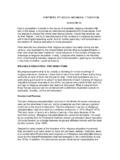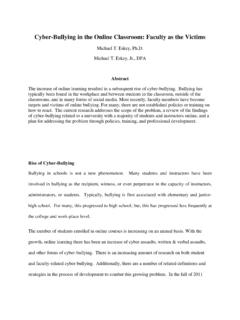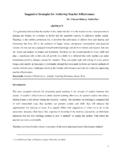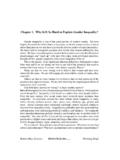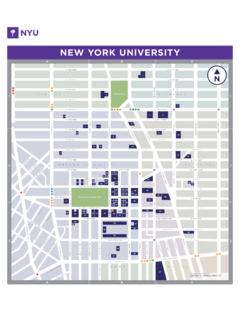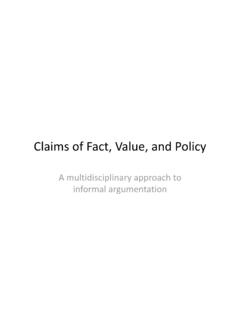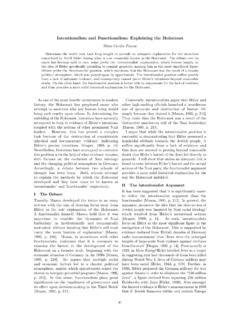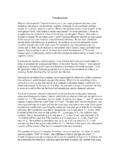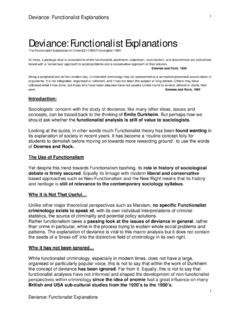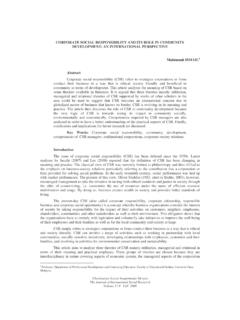Transcription of 4 Troubles with Functionalism - nyu.edu
1 4 Troubles with Functionalism , Behaviorism, and PhysicalismThe functionalist view of the nature of the mind is now widely behav-iorism and physicalism, Functionalism seeks to answer the question What are mentalstates? I shall be concerned with identity thesis formulations of Functionalism . Theysay, for example, that pain is a functional state, just as identity thesis formulations ofphysicalism say that pain is a physical shall begin by describing Functionalism , and sketching the functionalist critique ofbehaviorism and physicalism. Then I shall argue that the Troubles ascribed by function-alism to behaviorism and physicalism infect Functionalism as characterization of Functionalism that is probably vague enough to be accept-able to most functionalists is: each type of mental state is a state consisting of a dispo-sition to act in certain waysand to have certain mental states, given certain sensoryinputs and certain mental states.
2 So put, Functionalism can be seen as a new incarna-tion, of behaviorism. Behaviorism identifies mental states with dispositions to act incertain ways in certain input situations. But as critics have pointed out (Chisholm,1957; Geach, 1957; Putnam, 1963), desire for goal G cannot be identified with, say,the disposition to do A in input circumstances in which A leads to G, since, after all,the agent might notknowthat A leads to G and thus might not be disposed to do replaces behaviorism s sensory inputs with sensory inputs and men-tal states ; and Functionalism replaces behaviorism s dispositions to act with dis-positions to act and have certain mental states. Functionalists want to individuatemental states causally, and since mental states have mental causes and effects as wellas sensory causes and behavioral effects, functionalists individuate mental states partlyin terms of causal relations to other mental states.
3 One consequence of this differencebetween Functionalism and behaviorism is that there are possible organisms thataccording to behaviorism, have mental states but, according to Functionalism , do nothave mental states.(AutoPDF V7 9/1/07 10:34) MIT (Stone 7 9") StoneSerif&Sans J-1567 Block AC1: WSL 29/12/2006 pp. 63 102 1567_04 (p. 63)So, necessary conditions for mentality that are postulated by Functionalism are inone respect stronger than those postulated by behaviorism. According to behaviorism,it is necessary and sufficient for desiring that G that a system be characterized by a cer-tain set (perhaps infinite) of input-output relations; that is, according to behaviorism, asystem desires that G just in case a certain set of conditionals of the form It will emitO given I are true of it. According to Functionalism , however, a system might havethese input-output relations, yet not desire that G; for according to Functionalism ,whether a system desires that G depends on whether it has internal states which havecertain causal relations to other internal states (and to inputs and outputs).
4 Since be-haviorism makes no such internal state requirement, there are possible systems ofwhich behaviorism affirms and Functionalism denies that they have mental way of stating this is that, according to Functionalism , behaviorism is guilty ofliberalism ascribing mental properties to things that do not in fact have the difference just sketched between Functionalism and behaviorism, func-tionalists and behaviorists need not be far apart in (1975), for exam-ple, says, On one construal of it, Functionalism in the philosophy of mind is thedoctrine that mental, or psychological, terms are, in principle, eliminable in a certainway ( pp. 306 307). Functionalists have tended to treat the mental-state terms in afunctional characterization of a mental state quite differently from the input and out-put terms. Thus in the simplest Turing-machine version of the theory (Putnam, 1967;Block & Fodor, 1972), mental states are identified with the total Turing-machine states,which are themselvesimplicitlydefined by a machine table thatexplicitlymentionsinputs and outputs, described Lewis s version of Functionalism , mental-state terms are defined by means of amodification of Ramsey s method, in a way that eliminates essential use of mental ter-minology from the definitions but does not eliminate input and output is, pain is defined as synonymous with a definite description containing inputand output terms but no mental terminology (see Lewis, 1972).
5 Furthermore, Functionalism in both its machine and nonmachine versions has typi-cally insisted that characterizations of mental states should contain descriptions ofinputs and outputs inphysicallanguage. Armstrong (1968), for example, says,We may distinguish between physical behaviour, which refers to any merely physical action orpassion of the body, and behaviour proper which implies relationship to the mind.. Now, ifin our formula [ state of the person apt for bringing about a certain sort of behaviour ] behav-iour were to mean behaviour proper , then we would be giving an account of mental concepts interms of a concept that already presupposes mentality, which would be circular. So it is clear thatin our formula, behaviour must mean physical behaviour. (p. 84)Therefore, Functionalism can be said to tack down mental states only at theperiphery , through physical, or at least nonmental, specification of inputs andoutputs.
6 One major thesis of this article is that, because of this feature, functionalism64 Chapter 4(AutoPDF V7 9/1/07 10:34) MIT (Stone 7 9") StoneSerif&Sans J-1567 Block AC1: WSL 29/12/2006 pp. 63 102 1567_04 (p. 64)fails to avoid the sort of problem for which it rightly condemns behaviorism. Function-alism, too, is guilty of liberalism, for much the same reasons as behaviorism. Unlikebehaviorism, however, Functionalism can naturally be altered to avoid liberalism butonly at the cost of falling into an equally ignominious failing I speak of is the one that Functionalism showsphysicalismto be guilty physicalism, I mean the doctrine that pain, for example, is identical to a physical(or physiological) many philosophers have argued (notably Fodor, 1965, andPutnam, 1966; see also Block & Fodor, 1972), if Functionalism is true, physicalism isprobably false.
7 The point is at its clearest with regard to Turing-machine versions offunctionalism. Any given abstract Turing machine can be realized by a wide variety ofphysical devices; indeed, it is plausible that, given any putative correspondence be-tween a Turing-machine state and a configurational physical (or physiological) state,there will be a possible realization of the Turing machine that will provide a counter-example to that correspondence. (See Kalke, 1969; Gendron, 1971; Mucciolo, 1974, forunconvincing arguments to the contrary; see also Kim, 1972.) Therefore, if pain is afunctional state, it cannot, for example, be a brain state, because creatures withoutbrains can realize the same Turing machine as creatures with must emphasize that the functionalist argument against physicalism does notappeal merely to the fact that one abstract Turing machine can be realized by systemsof differentmaterial composition(wood, metal, glass, etc.)
8 To argue this way would belike arguing that temperature cannot be a microphysical magnitude because the sametemperature can be had by objects withdifferentmicrophysical structures (Kim, 1972).Objects with different microphysical structures, , objects made of wood, metal,glass, etc., can have many interesting microphysical properties in common, such asmolecular kinetic energy of the same average value. Rather, the functionalist argumentagainst physicalism is that it is difficult to see how therecould bea nontrivial first-order(see note 4) physical property in common to all and only the possible physical realiza-tions of a given Turing-machine state. Try to think of a remotely plausible candidate!At the very least, the onus is on those who think such physical properties are conceiv-able to show us how to conceive of way of expressing this point is that, according to Functionalism , physicalism is achauvinisttheory: it withholds mental properties from systems that in fact have saying mental states are brain states, for example, physicalists unfairly exclude thosepoor brainless creatures who nonetheless have second major point of this paper is that the very argument which functionalismuses to condemn physicalism can be applied equally well against Functionalism ; in-deed, any version of Functionalism that avoids liberalism falls, like physicalism, article has three parts.
9 The first argues that Functionalism is guilty of liberalism,the second that one way of modifying Functionalism to avoid liberalism is to tie itTroubles with Functionalism65(AutoPDF V7 9/1/07 10:34) MIT (Stone 7 9") StoneSerif&Sans J-1567 Block AC1: WSL 29/12/2006 pp. 63 102 1567_04 (p. 65)more closely to empirical psychology, and the third that no version of functionalismcan avoid both liberalism and More about What Functionalism IsOne way of providing some order to the bewildering variety of functionalist theories isto distinguish between those that are couched in terms of a Turing machine and thosethat are Turing-machine table lists a finite set of machine-table states, ; inputs, ; and outputs, The table specifies a set of conditionals of the form: ifthe machine is in state Siand receives input Ij, it emits output Okand goes into state is, given any state and input, the table specifies an output and a next state.
10 Anysystem with a set of inputs, outputs, and states related in the way specified by the tableis described by the table and is a realization of the abstract automaton specified by have the power for computing any recursive function, a Turing machine must beable to control its input in certain ways. In standard formulations, the output of aTuring machine is regarded as having two components. It prints a symbol on a tape,then moves the tape, thus bringing a new symbol into the view of the input the Turing machine to have full power, the tape must be infinite in at least one di-rection and movable in both directions. If the machine has no control over the tape, itis a finite transducer, a rather limited Turing machine. Finite transducers need not beregarded as having tape at all. Those who believe that machine Functionalism is truemust suppose that just what power automaton we are is a substantive empirical ques-tion.
